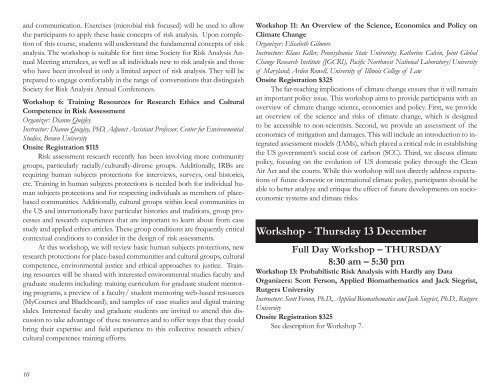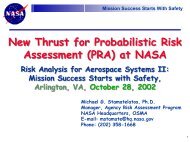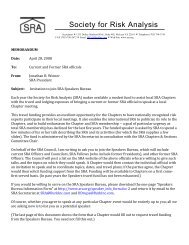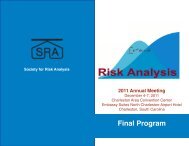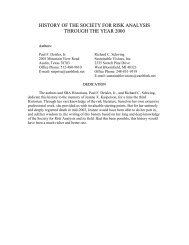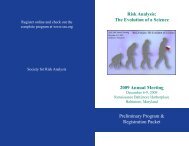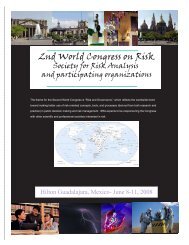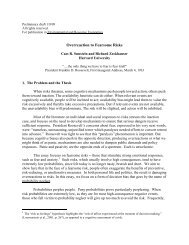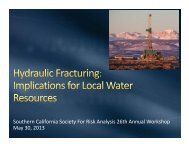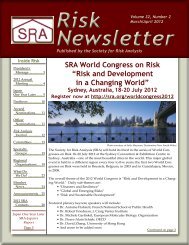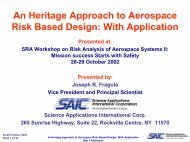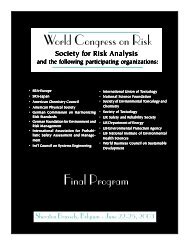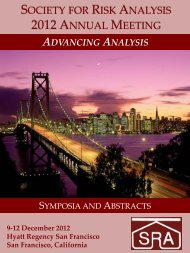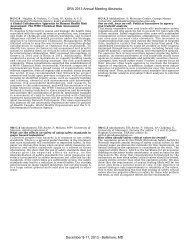Risk Analysis: Advancing Analysis - The Society for Risk Analysis
Risk Analysis: Advancing Analysis - The Society for Risk Analysis
Risk Analysis: Advancing Analysis - The Society for Risk Analysis
You also want an ePaper? Increase the reach of your titles
YUMPU automatically turns print PDFs into web optimized ePapers that Google loves.
and communication. Exercises (microbial risk focused) will be used to allow<br />
the participants to apply these basic concepts of risk analysis. Upon completion<br />
of this course, students will understand the fundamental concepts of risk<br />
analysis. <strong>The</strong> workshop is suitable <strong>for</strong> first time <strong>Society</strong> <strong>for</strong> <strong>Risk</strong> <strong>Analysis</strong> Annual<br />
Meeting attendees, as well as all individuals new to risk analysis and those<br />
who have been involved in only a limited aspect of risk analysis. <strong>The</strong>y will be<br />
prepared to engage com<strong>for</strong>tably in the range of conversations that distinguish<br />
<strong>Society</strong> <strong>for</strong> <strong>Risk</strong> <strong>Analysis</strong> Annual Conferences.<br />
Workshop 6: Training Resources <strong>for</strong> Research Ethics and Cultural<br />
Competence in <strong>Risk</strong> Assessment<br />
Organizer: Dianne Quigley<br />
Instructor: Dianne Quigley, PhD, Adjunct Assistant Professor, Center <strong>for</strong> Environmental<br />
Studies, Brown University<br />
Onsite Registration $115<br />
<strong>Risk</strong> assessment research recently has been involving more community<br />
groups, particularly racially/culturally-diverse groups. Additionally, IRBs are<br />
requiring human subjects protections <strong>for</strong> interviews, surveys, oral histories,<br />
etc. Training in human subjects protections is needed both <strong>for</strong> individual human<br />
subjects protections and <strong>for</strong> respecting individuals as members of placebased<br />
communities. Additionally, cultural groups within local communities in<br />
the US and internationally have particular histories and traditions, group processes<br />
and research experiences that are important to learn about from case<br />
study and applied ethics articles. <strong>The</strong>se group conditions are frequently critical<br />
contextual conditions to consider in the design of risk assessments.<br />
At this workshop, we will review basic human subjects protections, new<br />
research protections <strong>for</strong> place-based communities and cultural groups, cultural<br />
competence, environmental justice and ethical approaches to justice. Training<br />
resources will be shared with interested environmental studies faculty and<br />
graduate students including: training curriculum <strong>for</strong> graduate student mentoring<br />
programs, a preview of a faculty/ student mentoring web-based resources<br />
(MyCourses and Blackboard), and samples of case studies and digital training<br />
slides. Interested faculty and graduate students are invited to attend this discussion<br />
to take advantage of these resources and to offer ways that they could<br />
bring their expertise and field experience to this collective research ethics/<br />
cultural competence training ef<strong>for</strong>ts.<br />
Workshop 11: An Overview of the Science, Economics and Policy on<br />
Climate Change<br />
Organizer: Elisabeth Gilmore<br />
Instructors: Klaus Keller, Pennsylvania State University; Katherine Calvin, Joint Global<br />
Change Research Institute (JGCRI), Pacific Northwest National Laboratory/University<br />
of Maryland; Arden Rowell, University of Illinois College of Law<br />
Onsite Registration $325<br />
<strong>The</strong> far-reaching implications of climate change ensure that it will remain<br />
an important policy issue. This workshop aims to provide participants with an<br />
overview of climate change science, economics and policy. First, we provide<br />
an overview of the science and risks of climate change, which is designed<br />
to be accessible to non-scientists. Second, we provide an assessment of the<br />
economics of mitigation and damages. This will include an introduction to integrated<br />
assessment models (IAMs), which played a critical role in establishing<br />
the US government’s social cost of carbon (SCC). Third, we discuss climate<br />
policy, focusing on the evolution of US domestic policy through the Clean<br />
Air Act and the courts. While this workshop will not directly address expectations<br />
of future domestic or international climate policy, participants should be<br />
able to better analyze and critique the effect of future developments on socioeconomic<br />
systems and climate risks.<br />
Workshop - Thursday 13 December<br />
Full Day Workshop – THURSDAY<br />
8:30 am – 5:30 pm<br />
Workshop 13: Probabilistic <strong>Risk</strong> <strong>Analysis</strong> with Hardly any Data<br />
Organizers: Scott Ferson, Applied Biomathematics and Jack Siegrist,<br />
Rutgers University<br />
Instructors: Scott Ferson, Ph.D., Applied Biomathematics and Jack Siegrist, Ph.D., Rutgers<br />
University<br />
Onsite Registration $325<br />
See description <strong>for</strong> Workshop 7.<br />
10


